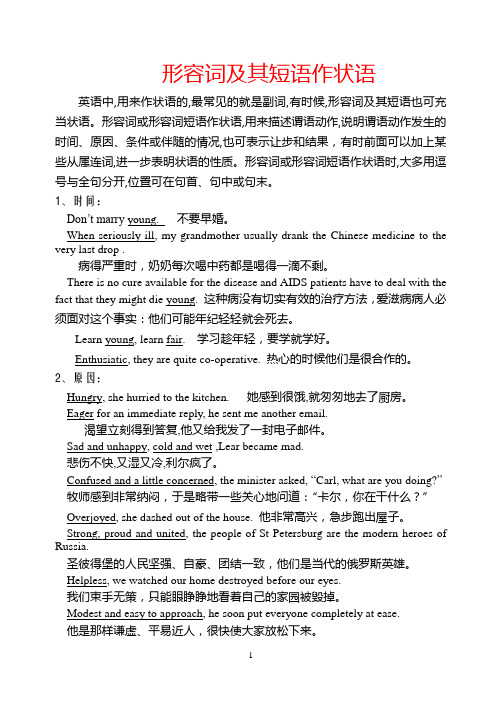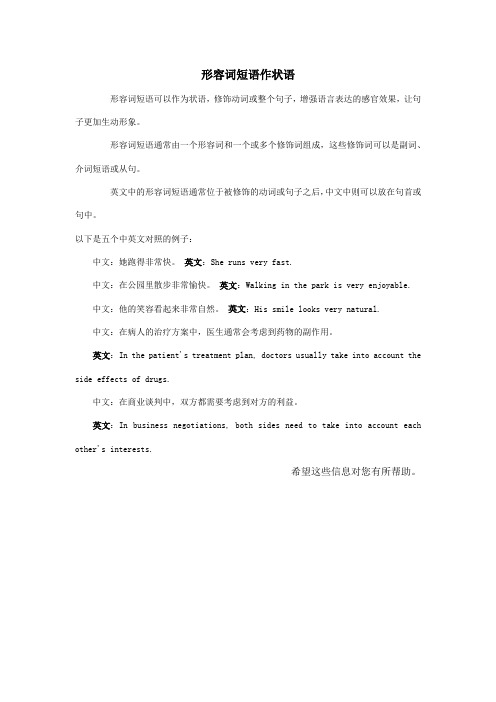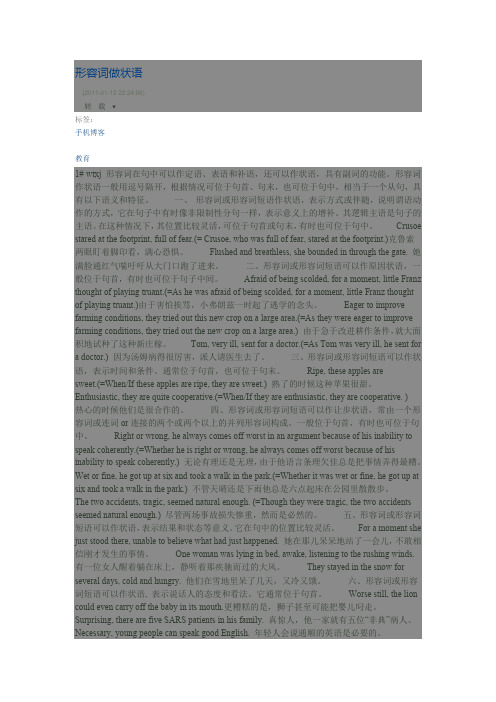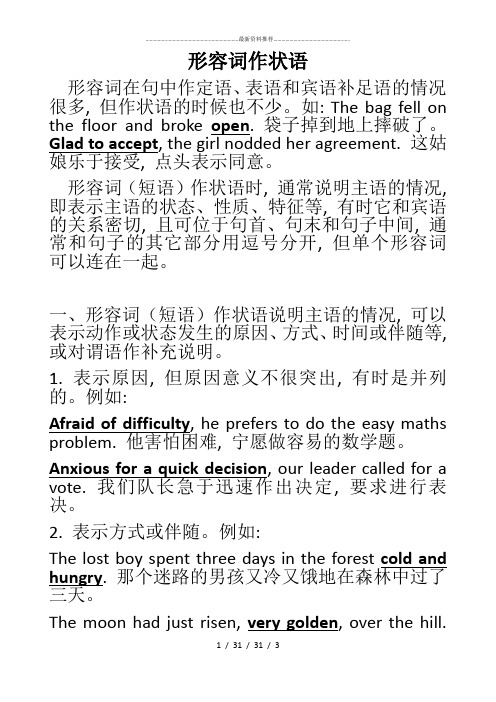形容词短语用作状语
(完整word版)形容词短语用作状语

(完整word版)形容词短语用作状语形容词短语用作状语陕西勉县二中,周雨松形容词不但可以作定语,表语和补语,还可以作状语,具有副词的功能。
现归纳如下:1. 作时间状语1) Ripe, these apples are very sweet。
成熟后,这些苹果非常甜。
2) we don`t eat vegetables raw.我们不会生吃蔬菜2. 作方式或伴随状语,具有补充说明谓语的作用3) For a moment she just stood there, unable to believe what had just happed.有一阵子,他站在那儿不能相信刚才发生的事情。
4) Overjoyed, they rushed to the front.他们非常高兴,急步跑到前面。
5) Crusoe stared at the footprint, full of fear.克鲁索盯着脚印看,满心恐惧。
6) He was lying in bed, awake, listening to the rushing wind.他醒着躺在床上,静听着那急风。
7) Cheerful, efficient and warm-hearted, they will do everything to make your journey smooth and comfortable。
他们乐观,能干,热情,一定会想方设法使你一路顺风。
3. 作原因状语8) Afraid of being scolded, for a moment, little Franz thought of playing truant。
害怕挨骂,小弗朗兹一时起了逃学的念头。
9) Easy to be with, he is warmly welcomed。
他平易近人,所以很受人欢迎。
4。
作让步状语10) Every nation, big or small, should be equal。
高中英语---形容词及其短语作状语

形容词及其短语作状语英语中,用来作状语的,最常见的就是副词,有时候,形容词及其短语也可充当状语。
形容词或形容词短语作状语,用来描述谓语动作,说明谓语动作发生的时间、原因、条件或伴随的情况,也可表示让步和结果,有时前面可以加上某些从属连词,进一步表明状语的性质。
形容词或形容词短语作状语时,大多用逗号与全句分开,位置可在句首、句中或句末。
1、时间:Don’t marry young. 不要早婚。
When seriously ill, my grandmother usually drank the Chinese medicine to the very last drop .病得严重时,奶奶每次喝中药都是喝得一滴不剩。
There is no cure available for the disease and AIDS patients have to deal with the fact that they might die young. 这种病没有切实有效的治疗方法,爱滋病病人必须面对这个事实:他们可能年纪轻轻就会死去。
Learn young, learn fair.学习趁年轻,要学就学好。
Enthusiatic, they are quite co-operative. 热心的时候他们是很合作的。
2、原因:Hungry, she hurried to the kitchen. 她感到很饿,就匆匆地去了厨房。
Eager for an immediate reply, he sent me another email.渴望立刻得到答复,他又给我发了一封电子邮件。
Sad and unhappy, cold and wet ,Lear became mad.悲伤不快,又湿又冷,利尔疯了。
Confused and a little concerned, the minister asked, “Carl, what are you doing?”牧师感到非常纳闷,于是略带一些关心地问道:“卡尔,你在干什么?”Overjoyed, she dashed out of the house. 他非常高兴,急步跑出屋子。
形容词短语作状语

形容词短语作状语
形容词短语可以作为状语,修饰动词或整个句子,增强语言表达的感官效果,让句子更加生动形象。
形容词短语通常由一个形容词和一个或多个修饰词组成,这些修饰词可以是副词、介词短语或从句。
英文中的形容词短语通常位于被修饰的动词或句子之后,中文中则可以放在句首或句中。
以下是五个中英文对照的例子:
中文:她跑得非常快。
英文:She runs very fast.
中文:在公园里散步非常愉快。
英文:Walking in the park is very enjoyable.
中文:他的笑容看起来非常自然。
英文:His smile looks very natural.
中文:在病人的治疗方案中,医生通常会考虑到药物的副作用。
英文:In the patient's treatment plan, doctors usually take into account the side effects of drugs.
中文:在商业谈判中,双方都需要考虑到对方的利益。
英文:In business negotiations, both sides need to take into account each other's interests.
希望这些信息对您有所帮助。
形容词做状语

形容词做状语(2011-01-12 22:24:56)转载▼标签:手机博客教育1# wtxj 形容词在句中可以作定语、表语和补语,还可以作状语,具有副词的功能。
形容词作状语一般用逗号隔开,根据情况可位于句首、句末,也可位于句中,相当于一个从句,具有以下语义和特征。
一、形容词或形容词短语作状语,表示方式或伴随,说明谓语动作的方式,它在句子中有时像非限制性分句一样,表示意义上的增补。
其逻辑主语是句子的主语。
在这种情况下,其位置比较灵活,可位于句首或句末,有时也可位于句中。
Crusoe stared at the footprint, full of fear.(= Crusoe, who was full of fear, stared at the footprint.)克鲁索两眼盯着脚印看,满心恐惧。
Flushed and breathless, she bounded in through the gate. 她满脸通红气喘吁吁从大门口跑了进来。
二、形容词或形容词短语可以作原因状语,一般位于句首,有时也可位于句子中间。
Afraid of being scolded, for a moment, little Franz thought of playing truant.(=As he was afraid of being scolded, for a moment, little Franz thought of playing truant.)由于害怕挨骂,小弗朗兹一时起了逃学的念头。
Eager to improve farming conditions, they tried out this new crop on a large area.(=As they were eager to improve farming conditions, they tried out the new crop on a large area.) 由于急于改进耕作条件,就大面积地试种了这种新庄稼。
英语形容词的用法

一、形容词(组)用作状语,常常表示伴随情况。
可以放在句首,也可放在句末。
例如:1.Over joyed,they rushed to the front. ——他们非常高兴,急忙跑到前面。
2.The thief hid himsel finthe corner,afraid of being caught.——小偷躲在角落里,担心被人抓住。
二、形容词(组)用作原因状语,通常位于句首。
例如:1.As he was thirsty and eager to get a little rest,he went into the tea house and seated himself at a little table by the window.由于口渴,又渴望休息片刻,他就走进茶馆,在靠窗的一张小桌旁坐下。
2.Easy to be with,he is warmly welcomed.——因为平易近人,所以他受到热烈欢迎。
三、形容词(组)用作结果状语,一般位于句末。
例如:1.They broke into the uncle’s bedroom and found the man lying on thefloor,dead.他们强行冲进叔叔的卧室,发现那个人躺在地板上,已经死了。
2.He returned from war,safe and sound.——他安然无恙地从战争中归来。
四、形容词(组)用作评注性状语,表示说话人的看法、态度和评价。
通常位于句首,常用逗号与句子隔开。
例如:1.Even more important,he is in charge of the project.——更重要的是,他负责这项工程。
2.Curious,the game should turn out that way.——真奇怪,比赛结果是那样的。
五、形容词(组)用作让步状语,常由一个形容词短语或or连接的两个以上的并列形容词短语构成。
高中英语语法形容词作状语

形容词作状语形容词在句中作定语、表语和宾语补足语的情况很多, 但作状语的时候也不少。
如: The bag fell on the floor and broke open. 袋子掉到地上摔破了。
Glad to accept, the girl nodded her agreement. 这姑形容词(短语)作状语时, 通常说明主语的情况, 即表示主语的状态、性质、特征等, 有时它和宾语的关系密切, 且可位于句首、句末和句子中间, 通常和句子的其它部分用逗号分开, 但单个形容词可以连在一起。
一、形容词(短语)作状语说明主语的情况, 可以表示动作或状态发生的原因、方式、时间或伴随等, 或对谓语作补充说明。
1. 表示原因, 但原因意义不很突出, 有时是并列的。
例如:Afraid of difficulty, he prefers to do the easy maths problem. 他害怕困难, 宁愿做容易的数学题。
Anxious for a quick decision, our leader called for a vote. 我们队长急于迅速作出决定, 要求进行表决。
2. 表示方式或伴随。
例如:The lost boy spent three days in the forest cold and hungry. 那个迷路的男孩又冷又饿地在森林中过了The moon had just risen, very golden, over the hill.月亮刚刚升起, 挂在山上, 十足的金黄色。
3. 形容词(短语)作状语时, 它和句中谓语动词在意义上的联系不密切, 只是对谓语补充说明。
Effective the first of October, our supermarket will close at eleven. 我们超市十一点关门, 从十月一日起生效。
Contrary to all advice, they started to climb the mountain during a storm. 他们不听一切劝告, 冒着风暴出发登山。
读后续写微技能——形容词作状语

用
四人一组,任选其中一个片段,合作完成。注意使用形容词作状语
片 1.Tom参加英语演讲比赛获第一名。(赛前,赛中,赛后) 段 2.Peter考试不及格,回家告知父亲结果。 描 3.Alice参加毕业典礼,看到同学在炫耀自己的毕业礼物,她 写 却没有。
4.Mary在超市遇到许多年未见的小学同学。
ห้องสมุดไป่ตู้
1.Tom参加英语演讲比赛获第一名。(赛前,赛中,赛后)
Thinking that her classmates would consider her to be a lazy girl, Meg sat on the floor, hopeless and worried. 5. Oliver went up to the master, with his bowl in his hand. He felt very frightened, but also desperate with hunger. Oliver, frightened and desperate with hunger, went up to the master, with his bowl in his hand.
用
形
容 5.她低下头,不知道该如何回答。
词 She hung her head, not sure how to reply. 作 6.简绝望地跪了下来,眼泪顺着脸颊流下来。 状 Desperate and hopeless, Jane knelt down, tears streaming down
语 her face. 在 7.回答不出老师的问题,学生们都保持沉默。 写 Unable to answer the teacher's question, all the students kept 作 silent. 中 8.饥寒交迫,那个小女孩不住地哭泣。 的 Cold and hungry, the little girl kept crying.
高中英语 写作 形容词 (短语)作状语

英语培补资料-----形容词(短语)作状语形容词最主要的功能是修饰名词,充当定语。
形容词还可以作表语和宾补,如make sb angr y, leave sb homeless, sb find it difficult/hard to do sth. Sth make it possible for sb to do sth. 其实,形容词作状语的用法也是不少见的,多用来表达人物的心理状态。
有人也称之为主语补足语,因为它们是补充说明主语的。
掌握好以下两个句型,必将极大地助力于读后续写!句型一: 主谓等……(简单句), +形容词(短语). (与全句用逗号隔开,位于句子后面)1.Jane rose at the break of day,hungry and thirsty.(2016年10月浙江卷)(Jane起身时的状态是“又饿又渴”。
为了表达这种状态, 该句使用了形容词短语hungryand thirsty作伴随状语。
)2. Bernard was greatly encouraged by John and other boys,full of confidence in his plan.(Bernard被几个男孩鼓励之后对计划充满了信心。
为了突出这一结果,该句使用了形容词短语full of…作结果状语。
)3. At the end of the day, he came home with the money he earned,quite happy. (他赚到钱回家了,内心非常高兴。
为了表达这种状态,该句使用了形容词短语quite happy作伴随状语。
)4. To his mother's relief, the little boy came back from the dangerous situation,safe and sound.(小男孩脱离了险境,安然无恙。
为了表达这种状态,该句使用了形容词短语safe and sound作伴随状语。
- 1、下载文档前请自行甄别文档内容的完整性,平台不提供额外的编辑、内容补充、找答案等附加服务。
- 2、"仅部分预览"的文档,不可在线预览部分如存在完整性等问题,可反馈申请退款(可完整预览的文档不适用该条件!)。
- 3、如文档侵犯您的权益,请联系客服反馈,我们会尽快为您处理(人工客服工作时间:9:00-18:30)。
形容词短语用作状语
陕西勉县二中,周雨松
形容词不但可以作定语,表语和补语,还可以作状语,具有副词的功能。
现归纳如下:1. 作时间状语
1) Ripe, these apples are very sweet.
成熟后,这些苹果非常甜。
2) we don`t eat vegetables raw.
我们不会生吃蔬菜
2. 作方式或伴随状语,具有补充说明谓语的作用
3) For a moment she just stood there, unable to believe what had just happed.
有一阵子,他站在那儿不能相信刚才发生的事情。
4) Overjoyed, they rushed to the front.
他们非常高兴,急步跑到前面。
5) Crusoe stared at the footprint, full of fear.
克鲁索盯着脚印看,满心恐惧。
6) He was lying in bed, awake, listening to the rushing wind.
他醒着躺在床上,静听着那急风。
7) Cheerful, efficient and warm-hearted, they will do everything to make your journey
smooth and comfortable. 他们乐观,能干,热情,一定会想方设法使你一路顺风。
3. 作原因状语
8) Afraid of being scolded, for a moment, little Franz thought of playing truant.
害怕挨骂,小弗朗兹一时起了逃学的念头。
9) Easy to be with, he is warmly welcomed.
他平易近人,所以很受人欢迎。
4. 作让步状语
10) Every nation, big or small, should be equal.
国家无论大小,都应一律平等。
11) Old or young, they all like these cartoon pictures.
无论年龄大或小,他们都不得喜欢这些卡通画。
5. 作评注性状语,表示说话人的态度,看法。
12) Worse still, the lion could even carry off the baby in its mouth.
更糟糕的是,狮子甚至可能把婴儿叨走。
13) Strange, they shouldn` t arrive by now.
奇怪,他们这会应该来了。
14) Surprising, little Gauss worked out such a problem in such a short time.
真惊人,小高斯在这么短的时间就算出了这么难的题目。
6. 结果状语
15) He returned from war, safe and sound.
他安然无羔地从战场归来。
